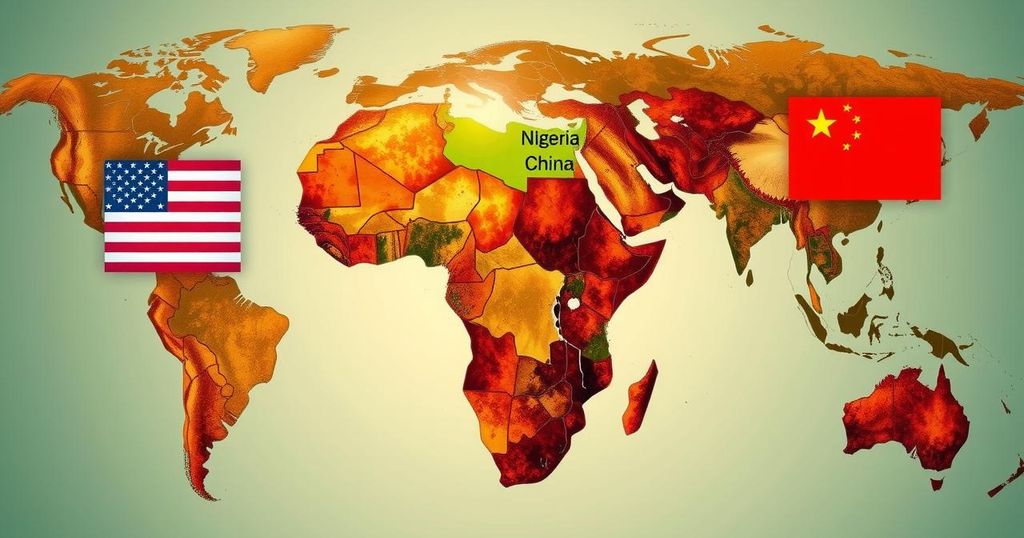The article discusses Nigeria’s need for a strategic foreign policy recalibration in light of the rapidly changing global order. It highlights insights from influential thinkers on the necessity of prioritizing realism, African agency, and addressing domestic challenges to enhance Nigeria’s position within the international arena.
The global order is undergoing rapid and significant changes, transitioning from traditional multilateralism to a more fragmented and multipolar environment. For Nigeria, which harbors continental aspirations but faces domestic hurdles, it is imperative to recalibrate its foreign policy. The country’s national security apparatus must acknowledge these shifts and adapt, moving away from outdated principles of alignment with Western powers and embracing a strategy centered on realism and African agency.
Lessons from esteemed scholars in international affairs, including Bolaji Akinyemi and Francis Fukuyama, reveal a common thematic urgency: nations must adapt effectively to survive in an evolving international landscape. Fukuyama’s insights highlight the waning of democracy and institutional integrity while indicating the necessity for Nigeria to bolster its domestic credibility, thereby amplifying its voice internationally.
Samuel Huntington’s notion of the “Clash of Civilizations” emphasizes the importance of cultural awareness in foreign policy, particularly poignant for Nigeria’s diverse society. Meanwhile, John Mearsheimer champions the principle that power dynamics, rather than ideals, dictate international relations. This perspective encourages Nigeria to pursue its sovereign interests without needing external validation.
Jeffrey Sachs elaborates on the intersection of development, climate sustainability, and justice, suggesting that a proactive foreign policy is essential for Nigeria. Embracing development and green diplomacy will position Nigeria favorably on the global stage amidst rising inequality and climate challenges.
Professors Akinyemi and Obiozor elucidate the necessity of Nigeria leading an African coalition capable of defining global norms rather than merely reacting to them. Akinyemi advocates for strategic non-alignment, whereas Obiozor emphasizes the connection between domestic legitimacy and effective foreign policy, highlighting that Nigeria remains directionless amidst changing global circumstances.
The strategic risks facing Nigeria are manifold. The geopolitical rivalry between the United States and China may constrict African nations into difficult positions. Furthermore, adverse impacts from climate change and rising nationalism threaten Nigeria’s prospects for trade and investment. Regional instability exacerbated by insurgencies further complicates these challenges.
Despite these issues, Nigeria holds a unique opportunity to spearhead diplomatic efforts throughout Africa. A commitment to reframing foreign policy to prioritize sovereignty and strategic realism, alongside enhancing capability within ECOWAS, ought to be foregrounded. Immediate actions include conducting a thorough review of foreign policy, advocating for an African Union summit, and diversifying strategic alliances while emphasizing sustainability in international engagements.
In conclusion, Nigeria faces a crucial juncture in redefining its foreign policy as a means to ensure national survival and advancement. An effective foreign policy will enhance Nigeria’s leverage in global affairs while a lack of direction renders it vulnerable. By drawing on the intellectual contributions of notable scholars and adopting a proactive stance, Nigeria can carve out a path of influence in a rapidly changing world. The necessity for decisive action cannot be overstated; inaction is simply not an option.
In conclusion, Nigeria stands at a pivotal moment in history requiring a thorough reassessment of its foreign policy. Strengthening domestic legitimacy and adapting to the evolving global landscape is essential for national survival and growth. By prioritizing strategic realism and African agency, Nigeria can assert its role in global affairs, transforming challenges into opportunities.
Original Source: businessday.ng




